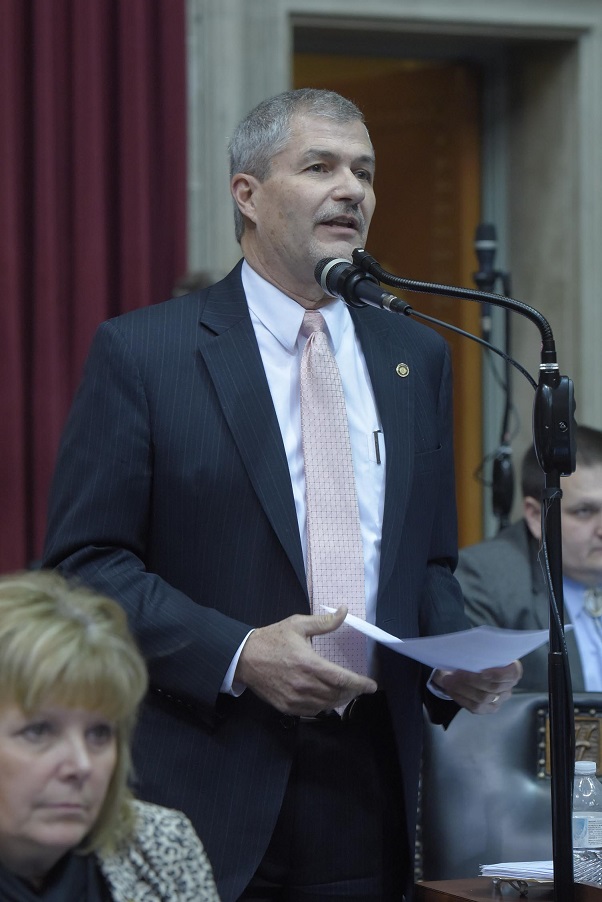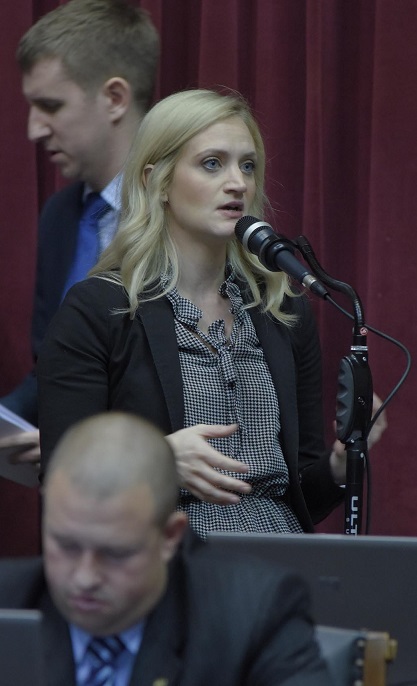An increased focus on issues concerning foster care in Missouri has resulted in a bill containing 11 different reforms meant to make life better for children who are in, and who leave, that care.

House Speaker Todd Richardson (R-Poplar Bluff) in January created the Special Committee to Improve the Care and Well-Being of Young People to focus on improving the state’s child welfare system. That committee is chaired by Cameron Representative Jim Neely (R), who selected 11 of the bills assigned to it to be combined into House Committee Bill 11.
Neely, a doctor, said improving the lives of children has been his priority since a young girl who’d been abused came into his office about ten years ago.
Neely said some of the things HCB 11 would change in Missouri law are “quick” or “simple” fixes that could have significant impacts, especially in situations in which foster children have been described as, “falling through the cracks.”
HCB 11 includes language that would update background checks on foster families so that the Children’s Division would know immediately if a foster parent is charged with a crime that would disqualify him or her from being a foster parent. Current law only allows checks every two years.

That portion of the bill came from House Bill 1944 sponsored by Representative Sonya Anderson (R-Springfield).
“House Bill 1944 would allow the Department of Social Services to utilize the RAPBACK program, which is the Record of Arrest and Prosecution, and so it’s a more instant update if a foster care parent or someone who resides in the house has been charged with a crime,” said Anderson. “We want to make sure that [foster] children are in the safest environment as possible.”
HCB 11 would also expand assessment and treatment services for children in foster care. It would require such services for all children in foster care – currently it is required only for those under the age of ten – and would require that those services be completed in accordance with the American Academy of Pediatrics’ periodicity schedule. Currently children are screened every two years.
The original sponsor of that language is Representative Lauren Arthur (D-Kansas City), who said it would ensure that children in foster care receive more appropriate care, and the comprehensive screenings will in turn save the state money by catching medical conditions earlier and aiding in preventative care.

“This would change the requirements so that every child in foster care is receiving these kinds of screenings, not just children under the age of ten. Additionally it means that they’ll receive more appropriate care, so according to the experts – the American Academy of Pediatrics – our children in foster care will go to the doctor according to their recommendations and that schedule as opposed to the legislature saying they have to go every two years,” said Arthur. “For older kids in foster care, often when they are pulled out of school more than their peers it adds to a feeling of stigma – they feel like they’re different from their classmates – and we certainly don’t want them to feel different or have to go to the doctor more than anyone else just because they’re in foster care.”
Another portion of HCB 11 comes from House Bill 1862 sponsored by Representative Phil Christofanelli (R-St. Peters). It would enable investigations of abuse of children in foster care in Missouri when it happens outside of the state.
Current law prevents Missouri Social Services workers from investigating reports of abuse of Missouri children in foster care if the abuse doesn’t occur in Missouri, and prevents them from communicating with counterparts in other states about abuse or potential abuse. Christofanelli said his bill would remove those barriers and fix what he called a, “bureaucratic technicality.”
“This is just eliminating some loopholes that have resulted in some unfortunate situations in the past and making sure that we have full communication across state lines to protect kids,” said Christofanelli.
He said HCB 11 is combining a number of efforts to fix situations in which lawmakers are told, all too often, that children are being “left behind.”

“It’s one of the most rewarding parts of being in the legislature and it’s such an easy fix. It’s shocking to me that this hasn’t been done yet because we’ve seen case after case where problems like this arise across state lines,” said Christofanelli. “Our kids are our greatest asset here in Missouri and if there’s anything that we can do to help keep them safe then we’re going to do it as the legislature, so I’m honored to be a part of that process.”
Some lawmakers expressed concerns with the portion of the bill because other states might release information about abuse claims – particularly unsubstantiated claims – that Missouri would not release. They expressed a desire to see that concern addressed before the bill could become law.
The House is prepared to vote on whether to send HCB 11 to the Senate. The bill is broadly supported, including by Columbia Democrat Martha Stevens, who sits on the Special Committee to Improve the Care and Well-Being of Young People.
Stevens said she’s glad to be on the committee but says it has more work to do even if HCB 11 becomes law, “particularly with children aging out of the foster care system, so I’m hopeful that in the interim, with stakeholders and advocates and experts and folks on both sides of the aisle we can bring forward more solutions next year to help address issues around foster care and support the Missouri youth that are aging out of foster care.”
Other parts of HCB 11 would:
– Provide free birth certificates to children in foster care, making it easier for them to become independent (found in House Bill 1470 sponsored by Representative Mike Kelley, R-Lamar)
– Allow more time for a case management plan to be developed for a child entering foster care (found in House Bill 1637 sponsored by Representative Neely)
– Allow foster children aged 16 years and older to open a checking or savings account with the consent of the Children’s Division or juvenile court, giving them the ability to cash paychecks and better access to jobs (found in House Bill 1715 sponsored by Representative Don Phillips, R-Kimberling City)
– Make closed under law any records regarding placement of children into foster care or kinship placements, and specify who can access those records and when (found in House Bill 1966 sponsored by Representative Robert Cornejo, R-St. Peters)
– Allow a child who is homeless or in the custody of the Children’s Division, but the whereabouts of his or her immunization records is unknown, to be enrolled in school for up to 30 days while efforts are made to find those records, and if needed, another 30 days after that for the child to get caught up on immunizations (found in House Bill 2139 sponsored by Representative Lynn Morris, R-Nixa)
– Define when juvenile courts have jurisdiction over a child under 21, streamlining situations in which a child is in a safe situation but juvenile court involvement is interfering with the family (found in House Bill 1728 sponsored by Representative Bill Lant, R-Pineville)
– Establish guidelines for educating children in court-ordered group homes or institutions for delinquent or neglected children (found in House Bill 2625 sponsored by Representative Lyle Rowland R, Cedarcreek)
– Create the “Trauma-Informed Care for Children and Families Board” to encourage cooperation between agencies that deal with children and utilize trauma-informed treatment programs (found in House Bill 2217 sponsored by Representative Cora Faith Walker, D-Ferguson)







